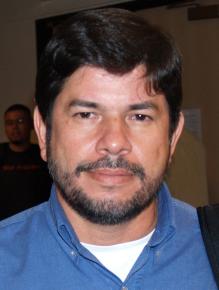Puerto Rico’s teacher rebellion
Some 250 teachers and education activists gathered in Los Angeles in April at the eighth Trinational Conference to Defend Public Education. For three days, representatives from several cities in the U.S., plus Canada, Mexico and Puerto Rico plotted a response to the creep of privatization into our schools.
In conversations, speeches and workshops, teachers detailed the many facets of what neoliberal education policies look like in different locations--for example, the gutting of the public education system in New Orleans. There were also the faces of the fightback--teachers from British Colombia, Puerto Rico and Oaxaca brought the stories of strikes that can help point the way forward for everyone.
During the conference, and interviewed participants to share some of their lessons with SocialistWorker.org readers. The interviews will run in a series over the next week.
This first installment features an interview with Rafael Feliciano Hernández, president of the Teachers Federation of Puerto Rico. Teachers on the island struck earlier this year to try to win collective bargaining rights; oppose Law 45, which makes it illegal for teachers to strike; stop the transformation of Puerto Rican schools into charters; and stand up to reprisals against teachers who were organizing.
HOW DID you build up to the strike?
THIS WASN'T the first time on strike for the Teachers' Federation. In 1993, we had a one-day strike against charter schools. It was a big defeat that led to the demoralization of militants. The corruption and anti-democratic practices inside the union became extreme.
But between 2003 and 2008, we have radically transformed a union that had been a conservative force in the Puerto Rican labor movement. The student rebellion contributed to the teacher rebellion. The students put up a banner, and their resistance was transmitted to the level of the teachers.
In 2004, we disaffiliated from the American Federation of Teachers because their colonial relationship to us was impeding the development of our struggle.
From that point on, we had many short strikes around specific demands to improve education. They were all illegal. We had delegates' meetings of hundreds of teachers. The existence of political groups in the teachers' union facilitated the process. We had open debate in which everyone could expound their point of view, and this neutralized the agents of the state within the union.
We set the date of the strike for February 21. It was seen as a scandal that the teachers were talking about this. There were 1,300 representatives at our delegates' assembly meeting, and we voted to strike by 1,200 to 15.
Some 20,000 teachers supported the strike; 8,000 of them were on the picket line. During the strike, thousands of publications were produced, which created a great level of discussion. It was led from the bottom up. Leadership from the top kills the capacity to struggle.
HOW DID teachers feel about the illegality of the strike?
IT IS important to say that the immense majority of teachers had never before participated in strikes or work stoppages. They had to overcome fears, threats and pressure that management and its allies used to paralyze the strikers. This occurred in the context of the repressive Law 45, which prohibits strikes and criminalizes all actions that imply the interruption of labor in public agencies.
The state made it a conflict between the FMPR and the state. All the media were against us. They were joined by both the AFL-CIO and Change to Win, which didn't have links with the communities or specific struggles.

The SEIU intervened with the Association of Teachers. Dennis Rivera and Roberto Pagán, among others, pressured the governor not to enter into agreements with the FMPR. This paralyzed the possibility of negotiation at the height of the struggle.
We didn't win our central demand, which was a collective bargaining agreement. We did win a raise, and the promise of a future raise, as well as an agreement that there will be no charter schools in Puerto Rico.
We also developed a new layer of leaders and militants: 8,000 teachers who no longer just talk about struggle because they've done it. They speak from a class perspective. It's not just a matter of dollars and cents. The strike process is an emancipatory and decolonizing experience. We gained a lot: the union and the country are not the same.
Would we have been able to do all this without the political groups within the union, which made the connections with what's happening in the world, with the war, with the gap between rich and poor? I think no. The workers would have been too constricted by the bosses' vision of the world.
DO YOU think the strike was a victory?
When we ended the strike, I was so happy, because there were no repression and reprisals. People were ecstatic. Other people asked me, 'Why are you so happy? We didn't win collective bargaining.'
But for us, the strike was an act of liberation. A high percentage of the 26,000 teachers fought actively. The only way to do this was to be democratic. We all decided to go out, and we all decided to go back.


